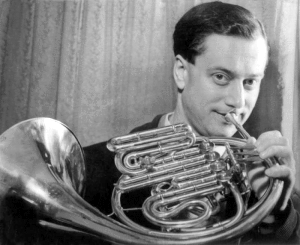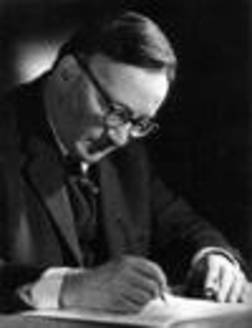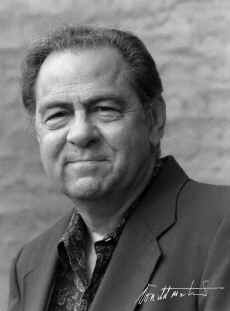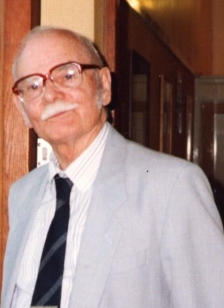Related Research Articles

Dennis Brain was a British horn player. From a musical family – his father and grandfather were horn players – he attended the Royal Academy of Music in London. During the Second World War he served in the Royal Air Force, playing in its band and orchestra. After the war, he was the principal horn of the Philharmonia and Royal Philharmonic orchestras, and played in chamber ensembles.

Sir Malcolm Henry Arnold was an English composer. His works feature music in many genres, including a cycle of nine symphonies, numerous concertos, concert works, chamber music, choral music and music for brass band and wind band. His style is tonal and rejoices in lively rhythms, brilliant orchestration, and an unabashed tunefulness. He wrote extensively for the theatre, with five ballets specially commissioned by the Royal Ballet, as well as two operas and a musical. He also produced scores for more than a hundred films, among these The Bridge on the River Kwai (1957), for which he won an Oscar.
Gordon Percival Septimus Jacob CBE was an English composer and teacher. He was a professor at the Royal College of Music in London from 1924 until his retirement in 1966, and published four books and many articles about music. As a composer he was prolific: the list of his works totals more than 700, mostly compositions of his own, but a substantial minority of orchestrations and arrangements of other composers' works. Those whose music he orchestrated range from William Byrd to Edward Elgar to Noël Coward.
Joseph Horovitz was an Austrian-born British composer and conductor best known for his 1970 pop cantata Captain Noah and his Floating Zoo, which achieved widespread popularity in schools. Horovitz also composed music for television, including the theme music for the Thames Television series Rumpole of the Bailey, and was a prolific composer of ballet, orchestral, brass band, wind band and chamber music. He considered his fifth string quartet (1969) to be his best work.

Franz Theodor Reizenstein was a German-born British composer and concert pianist. He left Germany for sanctuary in Britain in 1934 and went on to have his teaching and performing career there. As a composer, he successfully blended the equally strong but very different influences of his primary teachers, Hindemith and Vaughan Williams.

Sir George Dyson was an English musician and composer. After studying at the Royal College of Music (RCM) in London, and army service in the First World War, he was a schoolmaster and college lecturer. In 1938 he became director of the RCM, the first of its alumni to do so. As director he instituted financial and organisational reforms and steered the college through the difficult days of the Second World War.
Arnold Atkinson Cooke was a British composer, a pupil of Paul Hindemith. He wrote a considerable amount of chamber music, including five string quartets and many instrumental sonatas, much of which is only now becoming accessible through modern recordings. Cooke also composed two operas, six symphonies and several concertos.

Donald James Martino was a Pulitzer Prize winning American composer.

Ian Parrott was a prolific Anglo-Welsh composer and writer on music. His distinctions included the first prize of the Royal Philharmonic Society for his symphonic poem Luxor, and commissions by the BBC and Yale University, and for many leading British musicians. In 1958 his cor anglais concerto was first performed at Cheltenham Festival, and in 1963 his cello concerto was given by William Pleeth and the Hallé Orchestra – both concertos were conducted by Sir John Barbirolli.
Guy Anthony Woolfenden was an English composer and conductor. He was head of music at the Royal Shakespeare Company in Stratford-upon-Avon for 37 years, making music an integral part of over 150 productions there. He completed scores for the full canon of Shakespeare plays.
Aaron Copland's Clarinet Concerto was written between 1947 and 1949, although a first version was available in 1948. The concerto was later choreographed by Jerome Robbins for the ballet Pied Piper (1951).
Hugh Wood was a British composer.
Bernard (George) Stevens was a British composer who first became known to a wider public when he won a newspaper composition prize for a 'Victory Symphony' in post-war 1946. The broader success was not sustained, but Stevens went on to become a respected composer and teacher at the Royal College of Music, using traditional forms for his compositions while extending his essentially tonal harmonic language towards serialism.
Raymond Hyam Cohen was an English classical violinist.
Christopher Ball was a British composer, arranger, conductor, clarinetist and recorder player.
Stanley Bate was an English composer and pianist.
The Duet-Concertino for clarinet and bassoon, TrV 293, with string orchestra and harp in F major, was written by Richard Strauss in 1946/47 and premiered in 1948. It is the last purely instrumental work he wrote.
Aurelio de la Vega was a Cuban-American composer, lecturer, essayist, and poet. He wrote numerous works in many forms and media and, from the early 1960s, was an active force on the United States musical scene. Many of his compositions are published and recorded, and the majority of them are played constantly nationally and internationally. His music and aesthetic ideas have been commented upon and analyzed in books, newspapers and reviews throughout the United States and Latin America. In 1978 he was awarded the coveted Friedheim Award of the Kennedy Center for the Performing Arts, Washington, D.C., and was nominated four times for a Latin Grammy Award.
David Moule-Evans was an English composer, conductor and academic.
Frederick Thomas Durrant, typically known as F.T. Durrant, was an organist, musical academic and composer, long resident in Harrow.
References
- 1 2 Who's Who in Music, Fifth Edition (1969), p. 199
- ↑ Elinor Frances Morrisby, The role of Jan Sedivka in the development of Australian Contemporary String Music , 2009 thesis, University of Tasmania
- ↑ The Musical Times, Vol. 93, No. 1317, November 1952, p. 516
- ↑ Recorded on British Clarinet Concertos, ASV CD WHL 2141 (2003)
- ↑ Philip Scowcroft. A 336th Garland of British Light Music Composers , December 2002
- ↑ Alan Frank. 'Radio Music', in The Musical Times, Vol. 94, No. 1330, December, 1953, p. 570
- ↑ Graham Musto (16 April 2011). "2010 was the Centenary of Robert Still's birth". Robert Still MA, DMus(Oxon)1910-1971. Archived from the original on 2 August 2012. Retrieved 6 June 2011.
- ↑ 'Scholarships at the Royal College of Music', in The Times, 23 June 1946, p. 14